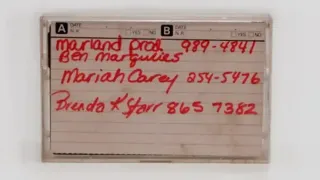November 17, 2023
EDGE Interview: Todd Haynes on 'May December': Female Desire and Tabloid Celebrity
Kilian Melloy READ TIME: 8 MIN.
The day before openly gay filmmaker Todd Haynes accepted the NewFest35 Queer Visionary Award – presented by none other than Tom Kalin – the director of "Carol," "Poison," "Velvet Goldmine," and so many other films from the last three decades that tackle LGBTQ+ and women's stories chatted with EDGE about his newest project, the Julianne Moore and Natalie Portman-starring "May December."
The star power and the title might suggest a lesbian romance, but Haynes – working from a script by screenwriter Samy Burch – creates a parable about identity, celebrity, and how we all seek to control the narrative about who we are and how we're perceived.
The plot's backstory is loosely based on the real-life scandal of Mary Kay Letoruneau, who was imprisoned in the late 1990s for having a sexual relationship with one of her sixth-grade students, gave birth while in prison (they had had one child before Letourneau went to prison), and, upon completing a six-year sentence, married the young man. The couple remained together for fourteen years.
In Burch's fictional screenplay, Gracie (Julianna Moore) and Joe (Charles Melton) have had a similar relationship, though theirs was a love that ignited in a pet store. More than two decades after a scandal that provided fodder to tabloids – and a marriage that has produced three children in all – an actress named Elizabeth (Natalie Portman) arrives to insinuate herself into Gracie and Joe's domestic life in preparation for playing Gracie in a movie based on their story.
Haynes' cinematic storytelling is in peak form, with characters seen only partially, glimpsed in mirrors, or seen gazing into the camera as though looking into a mirror – and, in one scene, unconsciously mirroring one another, a result of Elizabeth's intent study of Gracie. A kind of transposition of identity begins to take place, all while Gracie – who is not exactly a reliable narrator of her own story – sets about trying to maneuver Elizabeth into portraying her as she wants to be portrayed. At first a little busy and under-explained, the movie gradually reveals more of the story, just as the camera sometimes pulls back in long, unbroken moments to reveal more about certain key scenes.
EDGE caught up with Todd Haynes to geek out over his cinematic techniques, hear why women's' stories are a recurring source of fascination for him, and learn a few tidbits about his upcoming queer detective movie with Joaquin Phoenix.
EDGE: This is not the movie I thought it was going to be. I was expecting a movie about two women who fall in love – but, in a way, it's much more intimate than if they were lovers.
Todd Haynes: It's deranged. I can't really put it into the context of a lesbian relationship or a love relationship or female intimacy. It kind of blows all those things out of the water. It keeps you completely uncertain as to what it is between these two women, and that's what I loved about that script that Samy sent me. I never read it in any overtly gay narrative context, but in the way that people get to know each other, or don't get to know each other.
EDGE: Many of your movies explore the question of identity, and this movie comes at that question from so many angles.
Todd Haynes: I think that's true. I've made many films that feature female characters, but very few of them were about female desire, [where] the will of the female character is driving the narrative. And that is definitely true about "May December," and that puts it into a category that is outside the norms of most realistic stories about women and their lives. It falls outside the kinds of stories I've told about female characters.
EDGE: Samy Burch, the screenwriter for "May December," described this movie as being about how true crime tabloid sensibilities have permeated our culture. When you read that script, was that the hook for you to do this story?
Todd Haynes: Not exactly that. It doesn't really obsess me to crime dramas. I wasn't even following the Mary Kay LeTourneau scandal that closely when it happened in the 1990s – and, yes, a crime was committed. She was convicted of child rape. It's really more about boundaries, the inappropriate vicissitudes around love relationships and ages of consent, than it is about the way we think of crime stories that involve murder or crimes of that nature.
What I really loved about Samy's construction is that the whole tabloid event happened 20+ years in the past, and so what you really see is the way people endure those kinds of events, what it takes to continue on with your life. These people got together when the boy was not of age. She was arrested, she served her time, she came out, they got married, they raised the family, they did everything sort of right. And still, I think, a viewer of this movie is weighing these choices that were made so long ago, and wondering whether the young man ever had the chance to make decisions for himself that he should have been able to make. But, on the other side of that, he could have left her; he didn't have to marry her. He didn't have to raise a family with her. I think that's a very compelling part of the story, as well.
EDGE: Another fascination of your work is women's stories: How women move through the world, how they're treated. That's a subject for you as far back as "The Karen Carpenter Story." Why is that a recurring touchstone for you?
Todd Haynes: I guess I just think that's where real life happens. Women don't have the opportunity or the privilege to escape real life – it's choices, its repercussions, its burden. Genres that associate themselves more with male characters – the Western and the gangster film – let us deviate and let us escape. Stories about women's lives often return us to the home and the family, and that's where we all come from. I love that.
EDGE: Speaking of Karen Carpenter, and just for fun: I was in the audience in Santa Fe when you brought "Superstar: The Karen Carpenter Story" to Santa Fe in, I think it was, 1988.
Todd Haynes: That that trip was very important to me, because it was my first romantic outing with Jim Lyons, who starred in "Poison." We became lovers and partners and primary parts of each other's lives and, for me particularly, in what was happening around Act Up and activism at the time. Jim basically is responsible for the ideas that prompted "Velvet Goldmine" – he was my editor all the way through "Far from Heaven," and then he was too ill for cutting "I'm Not There," and he passed away a bit after that movie. But Santa Fe... man, that was an amazing trip.
EDGE: What can you say about working with Joaquin Phoenix on your next movie, which is said to be a queer detective story? You're already working on it; has it started filming?
Todd Haynes: No, we haven't [begin] shooting that, but we have a script I love, that came out of this unique process working with Joaquin, him coming to me with some ideas and thoughts on some other movies, and it built from that very, very intimately and organically – and pretty quickly. I brought in John Raymond, who's a dear friend of mine. I collaborated with John on "Mildred Pierce," and John has written most of Kelly Reichert's last six, seven films with her. He's a dear friend, and a brilliant writer. So, the three of us embarked on this together, and a lot of it was me talking on the phone with Joaquin, and me hanging out with John, and developing this backstory of a detective narrative set in Los Angeles in 1937 that ultimately was about this relationship between two men, a very unlikely pair. That's really what the film is about: The way they break through their boundaries to find their way to each other, with no real experience with a man, or with much romantic experience period in their lives preceding this relationship. We'll keep fingers crossed that it's interesting.
EDGE: Natalie Portman also brought you the script for "May, December," so you seem to be open to suggestions from people you end up working with.
Todd Haynes: Oh, yeah, I've been letting scripts come into my life since "Carol." And "Carol" was such a great experience for me. This is an original script that John and I wrote, but we'll share a story credit with Joaquin for sure. That was also really exciting – to write something from scratch again, but to have it come from this really remarkable person whose work I love. He's a really deep person who pushes through boundaries and obstacles and conventions in his creative instincts. And he did that for me, too, in the process of writing this.
"May December" is in limited release. For more information, follow this link.
Watch the trailer:






